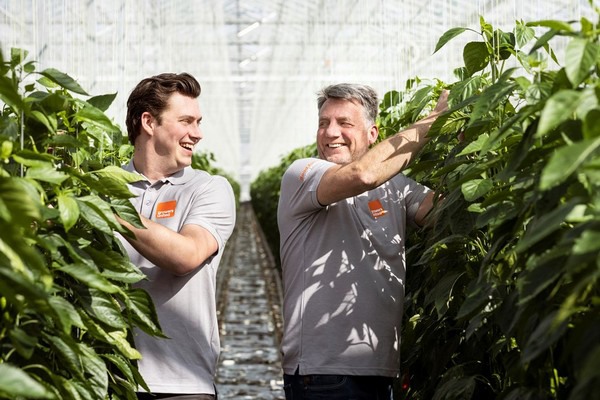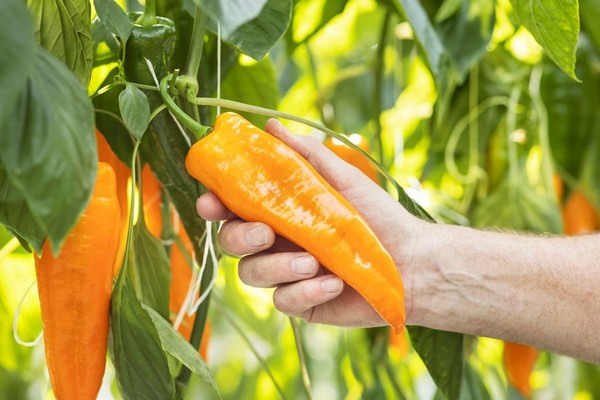He was one of the first to grow pointed peppers. That says everything about the progressiveness of Wim van der Lans. Wim was also quick in the field of sustainability. First as an individual grower, for 18 years under the SweetPoint flag and from 2015 also as a member of the Growers United cooperative. Wim talks about SweetPoint's sustainable ambitions.
“It just grew that way, really,” Wim answers when asked when sustainability became important for him. “It started with using less water. No more discharge. After that, more attention was paid to energy. We quickly purchased the first CHPs and later switched to alternative energy sources.” And so SweetPoint has taken major sustainable steps in recent years.

The power of working together: SweetPoint and Growers United
Eighteen years ago, he entered into a partnership with SweetPoint, back then there were only four growers. Now Wim, together with Michel Zuiderwijk, forms the management of the cultivation companies specialized in pointed peppers. SweetPoint is good for about twenty hectares of cultivation area of sweet pointed peppers at three locations: Made, Middenmeer and Honselersdijk. “Together you do everything just that little bit easier than alone. You can spar with each other. That's nice. Including about sustainability.”
Membership of the Growers United cooperative also contributes to sustainability. With 600 hectares, Growers United is one of the larger players in the production, packaging, and sale of fruit vegetables in Europe. Growers United has years of experience and extensive in-house knowledge, from which SweetPoint benefits. Including in the field of sustainability, says Wim. “Think of project groups that delve into various topics. We get useful information from that. Growers United stimulates and facilitates us in our sustainability. For example, all growers have a PlanetProof certificate.”
"Few sectors can match the horticulture industry"
According to Wim, many greenhouse horticulture companies have been taking sustainability seriously for a long time. “The sector has been aware of, for example, the consumption of water and energy for years. Sustainability has been taken seriously for a long time. Dutch greenhouse horticulture produces as efficiently as possible. We have come a long way in the energy transition.”
Maximum respect for people and the environment
'Dealing with the environment in a respectful way and operating in accordance with the principles of sustainability are of paramount importance to SweetPoint', is the description on SweetPoint's homepage. Wim explains the company's four points of attention: energy, 100% use, water, and crop protection.

Energy
“Our greenhouses are all Green Label. This means that we meet strict environmental requirements. We do everything we can to use and lose as little energy as possible. All three locations are connected to an external heat source. Honselersdijk and Middenmeer are connected to geothermal energy. We use CHPs at all locations. In short, we hardly use the boiler anymore.”
100% usage
“Our goal is to not throw anything away and to find a new destination for our waste. When we empty the greenhouse, we recycle all the waste.” SweetPoint is also continuously researching new cultivation methods that produce less waste. “And then there are the small-scale, local initiatives. Then you are talking about boxes and not barrels. For example, we bring class 3 peppers to a cheese farm that makes pepper cheese again. And my Galloway cows eat the pointed peppers that are no longer fit for human consumption.”
Efficient use of water
A lot of water is used for the production of food. While the worldwide availability of good water is becoming scarcer. SweetPoint is aware of this. “We use water as efficiently and economically as possible and we collect rainwater ourselves. The irrigation water we use is 100% recycled. All nutrients are also reused.”
Crop protection
“Our aim is to grow organically as much as possible. This means that we use as many natural enemies as possible to protect the crop and to combat pests or diseases. We only use crop protection products when there is absolutely no other option. Organic as much as possible, of course.” Crop protection products are continuously developing and improving. How does Wim ensure that he is always up to date and uses the best resources? “Biobest is our advisor. They are well aware of the latest resources and possibilities. And of course, we also look around us. What are others doing? What is available on the market?”
A look into the future
“Everyone strives for a 100% closed greenhouse system in the long run. So do we." Is that feasible? “The future will tell. For the time being, we will expand with geothermal energy in Middenmeer. And if there are new sustainable options, we like to be one of the first.” According to Wim, subsidies are a nice boost. “As a large, progressive party, we like to be at the forefront of trends and developments. That means that you sometimes also take risks as a pioneer. And of course, a boost from the government in the form of a subsidy helps.”
 Ludvig Svensson
Ludvig Svensson